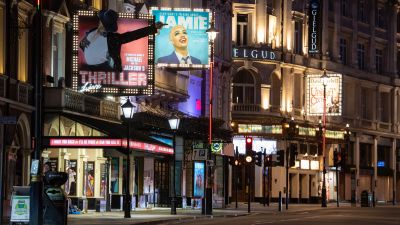Devastating impact of Covid on London theatre and arts as 40% made redundant

Tap above to watch video report by Rags Martel, words below by Jonathan Mitchell
Nearly 40 per cent of theatre and arts workers in London have been made redundant since the start of the coronavirus pandemic, ITV News can reveal.
Many of the workers, including backstage and barstaff working at the capital’s biggest venues, have also struggled to access vital Government support schemes such as furlough.
Of those who did receive support, more than half say the payments were so small they were unable to pay their household bills.
The findings come from an ITV News survey, conducted alongside the union Bectu, of more than 1,000 people living or working in London’s theatre, TV production, and live events industries.
It comes exactly one year since theatres closed in the UK, a day known in the industry as ‘Dark Monday’ due to the devastating impact of the pandemic on London’s West End.
Responding to the survey, famous West End actor Michael Ball described the findings as “heartbreaking”.
The survey found:
39% of workers had been made redundant at some point during the last year
20% have been unable to receive any financial support payment from the Government (including Furlough and the Self-Employment Income Scheme (SEISS)
49% say the payments were not big enough to cover their household bills
More than 54% workers have lost more than half their income during the last year
Nearly 60% have considering quitting the industry altogether because of the impact of pandemic
Bryony Lemon, a freelance costume maker living in Brixton, had been working on the major production the Prince of Egypt when the pandemic struck.
She was unable to find work for the past year and says she has struggled to access the SEISS scheme despite being eligible.
She said: “We’ve kind of been told by the Government that your profession isn’t valid, that it isn’t worthy.
“I’m angry, I’m angry about other people in other sectors who may have been able to work through the pandemic and may have received the help.”
The Government has already announced that furlough and SEISS will continue until September, describing the support they have offered to theatres as “unprecedented”.
Philippa Childs, head of Bectu, says support needs to be more targeted, including the introduction of insurance schemes.
She added: “One year on and the Government support schemes are still failing too many, with a staggering 20% excluded from support.
“The Government must use this anniversary to finally end the exclusion and give the industry the tools it needs for a successful reopening.
“This means targeted support for workers beyond the end of September and introducing a government-backed insurance scheme for theatre and live events – a policy that has worked so well for the film and TV industry.”
As part of the Government’s roadmap out of lockdown, theatres can partially reopen to the public for performances from May 17.
There have been criticisms among many in the industry, including the Society of London Theatres, of a perceived lack of financial support for theatres from the Government.
Some venues were only able open for a matter of weeks before the second wave of coronavirus ground London’s West End to a halt in December last year.
West End stalwart Michael Ball was rehearsing for the show Hairspray when London was put back into lockdown, and said he knows several actors and theatre workers who lost jobs.
He told ITV News: “It’s heartbreaking. It’s a real commitment to even go into this industry in ordinary times. There are few jobs, it’s usually not hugely well paid. You only go in it because it’s a calling, it’s a passion.”
He added: “We were the first to close, but we were the last to be even spoken about. That was frustrating and frightening.”
A Government spokesperson said: "We have provided unprecedented help for theatres and are working flat out to support them as they plan for reopening.
"The Culture Recovery Fund has allocated over £183 million for theatres to date and further awards will be on their way following a £300 million budget boost taking its total close to £2 billion.
"Individuals have also been able to receive help from the job support scheme that is continuing until September."